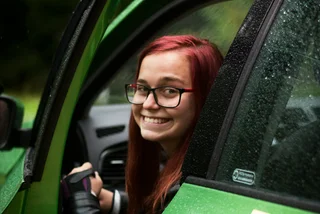Like most other businesses around the world, last year's pandemic-related closures resonated throughout the Czech auto-school industry and resulted in subsequent challenges for both students and schools.
In the Czech Republic, the stakes are about to get even higher for anyone who's contemplating getting their driver's license in 2021. Some important changes are being made to the written test as well as the number of times you are allowed to take the final exams.
Pavel Greiner founder and owner of Autoškola KING, a Prague-based driving instructor for over 15 years, gave us his insider perspective on what exactly these new changes will entail as well as insights on how the Covid pandemic has affected the industry at large.
Greiner's school has even responded to some of the recent challenges faced by drivers in training by launching a new VIP and VIP Gold service designed to help auto school students get behind the wheel with minimal stress.
What to expect on the new test
A significant number of new questions will be added to the final test, according to Greiner. "Those questions are focused on traffic concerns such as cycling infrastructure, more vulnerable road users, and specific climatic conditions," he says.
He adds that “hazard perception” videos will replace static images previously given in textbooks to test awareness of how to act at various types of intersections. While such technology is common elsewhere in the EU and abroad, in the Czech Republic it's relatively new.
More demanding tests aren't the only recent change to the process. "Students now have three attempts each to pass their driving or written exams. If they aren't able to pass after three tries, they are allowed to retake the exams only after repeating lessons," says Greiner.
Until the rules changed in July 2021, there were no limits on retaking the test. The Czech Association of Driving Schools, however, reports that of the 100,000 newly licensed drivers a year over 94 percent of them pass the final exams by the third attempt.
Quick facts about the new driving school rules
- One hundred new questions will be added to final exams over a three-month interval; the first 35 new questions will appear on Oct. 24.
- Over the next two years, the final theoretical exams should consist mainly of dynamic "video questions" focusing on risky encounters with a tram, cyclist, or simulating weather changes.
- The average number of possible questions for tests in the EU is 2,000 while the Czech tests draw from only 855. Currently, the Czech final test consists of 25 questions; the EU average is 40.
Source: Association of Driving Schools / Czech Ministry of Transport
Covid impact on driving schools
Administrative changes aside, Greiner says the Covid pandemic has presented the biggest obstacle for both students and auto schools over the past year.
"Skill as a driver is acquired through practice and repetition, so the Covid pandemic posed a real problem for students who need to retain skills and awareness during and after their test," says Greiner.
Auto school closures also led to numerous delays and canceled tests.
"For a while, there was a backlog of candidates throughout the entire country because tests were being delayed due to Covid closures and restrictions making it really impossible to get into a course," he says.
He believes that as a result, unscrupulous driving schools have, in the name of business efficiency, fast-tracked students who aren't quite ready to hit the road leading to less-than-confident new drivers.
Next-generation driving school
The founding principles of Greiner's school are just the opposite. He says that patient instructors who clearly and calmly explain everything that is required of each individual student make for better drivers in the long run.
“What you experience at driving lessons can vary a lot. You might get a different instructor every time or you may even be shouted at for failing to nail a parallel parking maneuver," says Greiner. (Griener knows a thing or two about parallel parking – the school's viral video on the topic currently has over 500k views on YouTube!)
He believes that when it comes to driving lessons for some students, it’s just a question of surviving the whole thing. "They are stressed out but simply trying to get through the experience," he says.
Autoškola KING‘s VIP and VIP Gold courses emerged from Greiner's personal experiences with some of the challenges students face. While all of his students receive the same attention and care, the VIP and VIP Gold courses, open to both Czech- and English-language students, are designed to alleviate some of the inconveniences that can add to the stress of getting your license in the Czech Republic.
"These are just things that make it easier for some students including being able to hop-on and hop-off at any place of your choice, priority for lessons and final exams, and also dedicated support from me personally," he says.
The new classes are just one example of how this Prague-based school is redoubling its commitment to educating competent, confident, and responsible drivers, something which is particularly important amid an overhaul of driving test regulations.
“When I founded Autoškola KING, I knew I was not aiming to create just another driving school churning through students like a conveyor belt. I was choosing to do what I enjoy doing, and to do it with love," Greiner says.
This article was written in association with English-friendly driving school Autoškola KING. Founded in 2007 by Bc. Pavel Greiner the schools offer a professional approach and excellent English as well as training on automatic cars. Read more about our partner content policies here.












 Reading time: 4 minutes
Reading time: 4 minutes 





























